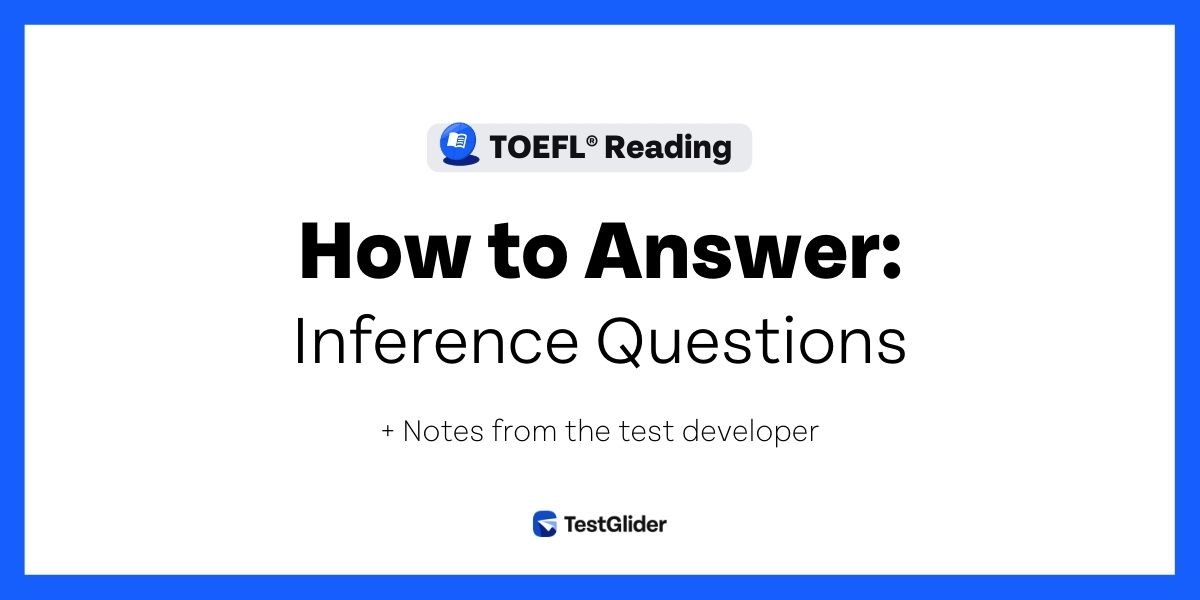1. Information about Inference Questions
TOEFL Reading Inference questions ask the test taker to identify an idea that was suggested by the information presented in the passage but not directly stated. They are easy to identify because they usually have the word “infer” or “imply” or “suggest” in the question.
The test taker needs to be able to understand all of the ideas and concepts in the passage and use them to logically see what other details the author was trying to imply. These questions are similar to inference questions because they ask for information that was not directly stated in the passage.
All of the answer choices will include information that was presented in the passage, but the distractors will make statements that cannot be inferred from that information. They may be accurate statements about the topic, but the reader would only know that from their own prior knowledge, so they would be incorrect answers.
Common ways to write such questions are as follows:
- Which of the following can be inferred from paragraph 1 about X?
- In paragraph 1, the author implies that X …
- Paragraph 1 suggests which of the following about X?
2. Question Example
Here is an excerpt from a passage and its Negative Factual Information question:
“Both chemicals and drugs can cause sudden and dramatic changes in gene expression, but the two most influential factors in most cases are diet and stress. The amount of calories that a person consumes and the quality of the nutrition that their food contains have significant and obvious effects on that person’s development and health, but they can also affect future generations. In 1944, the Netherlands experienced a serious famine due to ongoing war that affected around 4.5 million people. People who were accustomed to a normal and healthy intake of around 2,000 calories per day were limited to one quarter that amount. Women who were pregnant during the famine unsurprisingly had babies who had much lower than average birth weights. Those children enjoyed a normal diet, but when women from that generation had their own children, their babies also had abnormally low birth weights. In addition, women born during the famine had double the average incidence of schizophrenia.”
Q: What can be inferred from paragraph 3 about the famine?
(A) It caused epigenetic changes that mothers passed on to their children.
(B) It made pregnant mothers more likely to develop schizophrenia later in life.
(C) It was caused by a prolonged period of conflict between nations.
(D) It caused 4.5 million people to die from starvation.
Explanation
The correct answer is (A).
Because the grandchildren of the women who experienced the famine also had low birth weights, it is logical to infer that an epigenetic change was inherited.
(B) is incorrect because the paragraph says that women born during the famine were more likely to have schizophrenia later in life, not the women who were pregnant during the famine.
(C) is incorrect because the paragraph does not say that more than one nation was involved in the war. Test takers may know that the famine was caused by World War II, but that is prior knowledge that cannot be inferred from the passage.
(D) is incorrect because the paragraph says that 4.5 million people were affected, but that doesn’t mean that they all died. Since the women gave birth, and their children definitely survived the famine, clearly many people who were affected did not die of starvation.
3. Notes from the Test Developer
TOEFL Reading Inference questions are common and there is usually 1 or 2 per passage. These questions are similar to Rhetorical Purpose questions because they ask for information that was not directly stated in the passage.
However, one must use the information that is presented in order to choose the answer that could be logically inferred. The distractors will include details from the passage, but they will make illogical assumptions based upon that information.
I try to make all of the claims sound plausible so test takers have to carefully examine each answer choice in order to determine if that conclusion could reasonably be extrapolated from the information in the passage. When possible, I also try to make distractors that are factual statements, but they are not supported by the information in the passage. The reader may recognize that it is accurate from their prior knowledge, but that is not inference.
4. Advice to Test Takers
I would advise test takers to do a few things when they need to solve an Inference question. First, keep in mind that you are being asked to make an educated guess based on information in the passage.
All of the answer choices may contain details from the passage, but only one answer choice will be correct. Second, while it is possible that more than one answer choice may be factual, only one answer choice will be logically inferrable. You should read the passage and each answer choice carefully to see whether the inferences they make are logical.
Finally, you have limited time, and the distractors are meant to seem plausible, so you may be unable to decide between two answer choices. In that case, guess. Remember that you do not get points deducted for wrong answers in TOEFL. This is true for all questions so if you don’t know the answer or if you don’t have time to actually solve the question, guess.
